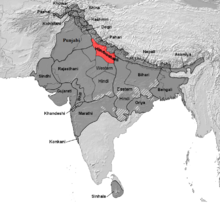हिन्दी
| Hindi | |
|---|---|
|
Hindī |
|

The word "Hindi" in Devanagari script
|
|
| Pronunciation | Hindustani pronunciation: [ˈɦin̪d̪iː] |
| Native to | Northern India (Hindi Belt) |
|
Native speakers
|
260 million (2001) L2 speakers: 120 million (1999) |
|
Early forms
|
Sauraseni Prakrit
|
|
Devanagari Devanagari Braille |
|
| Signed Hindi | |
| Official status | |
|
Official language in
|
|
|
Recognised minority
language in |
|
| Regulated by | Central Hindi Directorate |
| Language codes | |
| ISO 639-1 | hi |
| ISO 639-2 | hin |
| ISO 639-3 | |
hin-hin |
|
| Glottolog | hind1269 |
| Linguasphere | 59-AAF-qf |

Areas (red) where Hindustani (Khariboli/Kauravi) is the native language, compared to all Indo-Aryan languages (dark grey)
|
|
Hindi (Devanagari: , IAST: Hindī), or Modern Standard Hindi (Devanagari: मानक हिन्दी, IAST: Mānak Hindī) is a standardised and Sanskritised register of the Hindustani language. It was also influenced, especially in vocabulary, by various other languages including Persian, Sanskrit, Chagatai, Arabic, Turkish, Portuguese, and English.
Along with the English language, Hindi written in the Devanagari script is the official language of the Government of India. It is also one of the 22 scheduled languages of the Republic of India. However, it is not the national language of India because it was not prescribed as such in the Indian constitution.
Hindi is the lingua franca of the so-called Hindi belt in India. Outside India, it is an official language which is known as Fiji Hindi in Fiji, and is a recognised regional language in Mauritius, Trinidad and Tobago, Guyana, and Suriname. Apart from specialized vocabulary, Hindi is mutually intelligible with Standard Urdu, another recognized register of Hindustani.
...
Wikipedia
